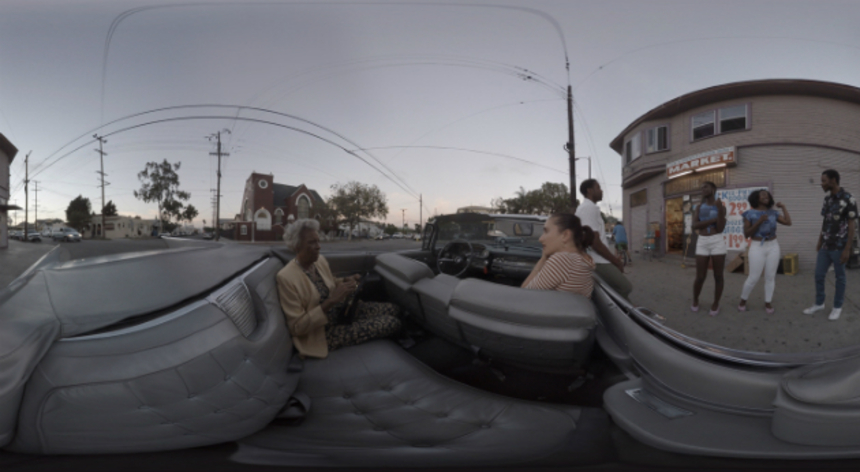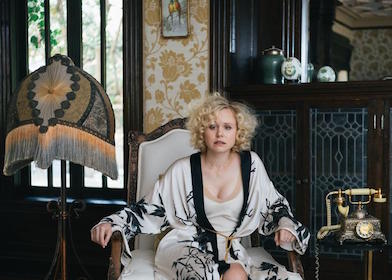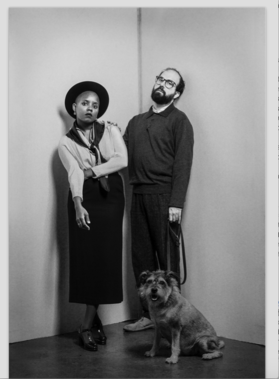Tribeca 2016 Interview: Janicza Bravo Talks HARD WORLD FOR SMALL THINGS, As Her Big World Gets Bigger With VR

It is rare to encounter an artist at the beginning of their career and know, innately, that you are in the presence of a master of their form. Janicza Bravo is one such artist, and after five distinct short films, plus her new epic VR experience screening at Tribeca after premiering at Sundance, it seems as though the world is starting to know the extent of her mastery.
At the Ace Hotel in New York, Bravo and I got comfy. An hour later, a conversation that started about Hard World For Small Things veered into the role of race in her SXSW short Woman In Deep starring Alison Pill, to the lack of respect of short film as a genre, to what filmmakers should wear on the festival circuit, and culminated in her whispering some BIG projects that are on the horizon, as well as giving ScreenAnarchy an exclusive screening of a rough cut of her new Michael Cera-helmed short, Hell In The Afternoon.
ScreenAnarchy: Hello Janicza! So nice seeing you. I need to take a moment because you just took me to hell and back...HARD WORLD FOR SMALL THINGS had me going through!
Janicza Bravo: As it should. It means you have a beating heart. A cousin of mine was asphyxiated by the cops in the Flatbush area of Brooklyn in the summer of '99. I was 17 and we weren't incredibly close. The most important things to me then were who I might kiss, who wanted to kiss me, Tommy Hilfiger, and my perfectly quaffed hair. And still it's hard to forget this kind of thing. My father was broken. Hard World is a tribute of sorts.
Wow...To tell this story in this way is to do something that I don't think was done in the last decade outside of Claudia Rankine's CITIZEN. Which is, essentially, trap people inside the bodies of those who experience structural racism in the ways they experience them. This film blows opens open the possibilities of what VR can do for empathy. You're on the frontlines of VR! How amazing does that feel?
More like confounding. It's funny to be on the frontline of a medium that is in many ways totally foreign to me. When I shot the short last year, I thought no one would ever see it. I treated it as an exercise. It was an opportunity to work with a group of actors I admired on a story that hit home. In my mind we were working on a play. Meaning that there would be no tangible record of it. It would exist only in the stories we would tell because no one would be able to get ahold of it. I think some of that attitude has to do with its impact. I wasn't thinking of the end result, I was only in the now of it. The immediate exorcism.
I feel like you've spoken to a lot of people about how you found your way into the world of VR, but I don't know if I've heard you really explain why you chose this story when you were offered the chance to make your VR debut...
About a year ago I was approached by Eve Cohen and James Kaelan of Seed and Spark. They were closing the deal on a joint venture with Wevr, the company that executive produced the piece. The idea was to start a grant type program that would fund projects that might have a harder time finding money.
I think we all thought I might make a dark comedy in the realm of my other outings. As I started to flesh out an idea, the thought of being submerged in one of my dark comedies seemed more like a nightmare and less like something I wanted to do.
Virtual reality is a front row experience. The viewer is dropped into a world without agency. I think my work for the most part is best experienced at a distance. There is something comforting in a flat image when your high notes are anxiety and loneliness which are major themes in all my work.
All that is to say the idea that I arrived at is the opposite. It's a little political for me. I tend to stray away from politics and go head first into bad feelings. But with this I was drawn elsewhere. Story after story after story of a cop shooting an unarmed man. It was unavoidable. The terror it filled me with was hard to put into words. Hopelessness, powerlessness. A desire to protest and resist but also an overwhelming feeling that I am in fact lacking in the tools needed for radical change.
I have a concrete sense of my own blackness, my own flesh. But I can't begin to understand what its like for my brother. What it's like to live in skin that conjures an unconscionable irrational rage. Hard World for Small Things is an invitation to a day in the life of a tight knit community in South Central LA.
Yes, and that comes through beautifully in everything from the way it's shot to the styling, everything! What was it like working with this team? Bright Ideas produced right? But you still worked mainly with performers and a creative department that you've had in other projects, correct?
I assembled my usual cohorts. My cinematographer (Christian Sprenger), composer (Heather Christian) and production designer (Rachael Ferrara) I am zero without them. They make me look like I know what's happening on a level that is bananas. The real bones of the operation was Han West who heads Meridian Content, a production company in LA. He ran the project under his umbrella and took care of everything.
That is all the unsexy stuff that happens behind the scene so that what ends up on screen feels totally effortless. Another key player is was Luis Blackaller a creative at Wevr. He helped with the how to bring my vision to light. I am not a technical filmmaker and so he was there for the nuts and bolts of it. So he helped shape how it unfolded. I had a set of idea of blocking and camera placement and he encouraged that we do a test shoot which was super useful. All the obstructions were crystallized and so it made my work on set less about where to stand and more about character. Good VR, good film or good theatre is at the core good storytelling.

Let's talk a bit about WOMAN IN DEEP! When I was at SXSW I was--, it blew me away. So very lovely and so much of a departure but an affirmation of the work you've been doing before this. Much like with HARD WORLD FOR SMALL THINGS, in many ways, it felt like a coming out -- a surreptitious statement proclaiming your blackness and femaleness in an undeniable way.
Not that your previous films didn't always feel to me as though they were decidedly from the POV of a black woman, but just that for a certain type of audience member there could be a level of willful obtuseness about how your identity shaped the narrative. Was this a conscious choice on your part, or was it just the story that was begging to be told?
Yes! To both. When I was putting together my first shorts I wanted the work to feel devoid of race and sex. That is to say I actively wanted my work to feel like it had been made not by me. Clearly it's made by me and it feels like me but it doesn't look like what I look like whatever that means.
People ask me often who has helped me with my work. That used to feel really bad but I understand where it comes from. I don't think it's right but I am aware of the root. My first short, Eat is about a woman who gets locked out her apartment and ends up inside the apartment of an off neighbor. It stars Brett Gelman and Katherine Waterston. It played SXSW give years ago. It was my first fest as a filmmaker. When I introduced myself as the writer and director and editor after the first screening, there was an audible gasp.
The only other time I had felt something similar was after a phone interview I had done for a summer job when I was in high school. When I came in for the face to face my boss to be said, "You sound different on the phone." People build the expectation of what it is they think you'll be, based on what you've crafted, based on what you embody.
My other big takeaway from my first year at SXSW happened during a Q&A. A black woman asked why there were no black people in my film? She said that when everyone came up on stage she assumed the film I was with was not the one I was with. This question haunted me for quite some time. I felt a kind of defensiveness. I thought why not ask all the other white male filmmakers why there were no blacks in their work.
I used to think that it wasn't my responsibility. I used to think that inclusivity was something that just happened. You go to the movies, you turn on the TV, you go to plays... and you don't see yourself. It's alarming. I hadn't realized what I had become used to. I started to feel like I was disappearing, like I was invisible.
Woman in Deep came by way of a grant that included a weekend in Nantucket during the Nantucket Project, which is like TedTalks but near the sea. At it I met Nancy Lublin, who had started dosomething.org. She was there with another not for profit, Crisis Text Line. In the day or days after a person of note kills themselves the national suicide prevention hotline is so inundated with calls that people are put on hold. That was my first seed.
The second was, if you've ever been to Nantucket, much of the staff on the island is Jamaican. Sounds cool, but it's actually really upsetting. At least it was for me. There is a visa program that gives Caribbean folks permission to work on the island 6-9 months out of the year. So it's like being on a distillation of a plantation just outside of Massachusetts. Did I answer the question?
Yes it does haha...I love that. That sort of leads me to my next question, which is: How do you see your oeuvre of short films working into your overall canon? Over the last few years you've shown yourself to be an undeniable master of the form, so much so that I don't know if I ever need to see a "feature" from you because you serve such big meals on a small plate. Is there a part of you that wants to deny the perceived direction your career "should take" in order to become an Alice Munro or Jamaica Kincaid of short form cinema?
You're divine. Can I say that in our interview? I'm blushing. I have a handful of features that are in various stages. I've been offered some too but none have hit me on a gut level.
A feature is at least a couple of years of life. So if I'm going to commit, I've gotta want to spend time in that text. There is this notion that short films are less than or that they are a step on the way to something more substantial. Money people, film people treat this space as small, which as you can imagine feels great.
I feel the work I have made is quite full. If I were a poet or a writer of short stories, would I be asked when I was going to write my first novel? I'm just saying what you already said in your beautifully worded question. I am happy making what I am making. I'm happy that I am getting to make it at all. If my whole career was only work under 30 minutes, I would not feel like I had failed.
Finding funding to make work on your terms is incredibly difficult. And I am deeply grateful for every opportunity bestowed on me. This arena is totally out of my realm. My parents are tailors. I'm first generation. I didn't go to film school and so in some ways my pieces have been exercises in the medium. It's a constant exploration. All of it. Being alive on the planet.
Can we talk about your love of performers? I think that you may have changed the way many people saw Michael Cera in GREGORY GO BOOM, you introduced me to the talents of Anna Rose Hopkins and Jason Lew, and now in WOMAN IN DEEP you've given Allison Pill the type of performance that respects her range in a way that your peers outside of New York stages have not up into this point. Where do you start when you begin to cast these performers in these roles?
I went to theatre school at NYU. I studied directing and design at Playwrights Horizons. And for about four months after college I thought I was going to be an actor.
Much to my dismay, auditioning was a total bummer. My love and respect of actors is deep. That is clear. There is nothing without them. I trust them implicitly and I ask a lot of questions and I crave for the back and forth. It's a constant dialogue. I have my ideas of how things ought to be played and they have theirs.
I am always drawn to the overly theatrical. It's my words but it's their bodies and their voices. They're the conduits. I don't exist without them. Alison Pill is a brilliant ball of light. That I got to work with her and anyone else who has ever said yes to me is fortunate.
When people go to the movies they don't remember the lights or the clothes or that it was a tracking shot. They remember who they saw. And if who they saw takes them there then they remember all the other stuff. It's all collaboration. Every inch of my work is the muscle of many. My cinematographer (Christian Sprenger), composer (Heather Christian) and production designer (Rachael Ferrara) are as much a part of why the performance shines as I am.
OK...we should start to wrap because I could talk to you all day, but what's next for you?
Next, next, next. I always hate this question because it's the kind of thing I'd rather arrive at naturally. I could rattle off a juicy list... and trust it's juicy but when I hear myself saying it out loud it sounds so déclassé. We've all met this guy at the party. The guy who won't stop talking about meetings and pitches and deals and agents and it all makes me so nauseous. I can't stand it. But you I can tell, I just don't want it in print.
Oh my god that's amazing. This has been wonderful and I have to say I can't get over this whole look you're serving today...As a fellow sartorialist could you please give me and everyone else who reads ScreenAnarchy advice on how to always serve on the Festival circuit? Should the looks be festival specific or are you more into a sort of young filmmaker uniform?
Clothing is very important to me, can you tell? How I present myself matters a great deal. Every article on my body is a story. I'm communicating in paragraphs before I have even said a word. I have a set uniform which usually involves white jeans. It's kind of flamboyant. It makes me feel like a peacock. I think my style is somewhere between peacock and skunk, yacht and high-rise.
Is that the worst thing I have ever said? I know that I haven't answered the question but, like, I just can't. I can only do me and my dog and my husband and that's already a lot.








